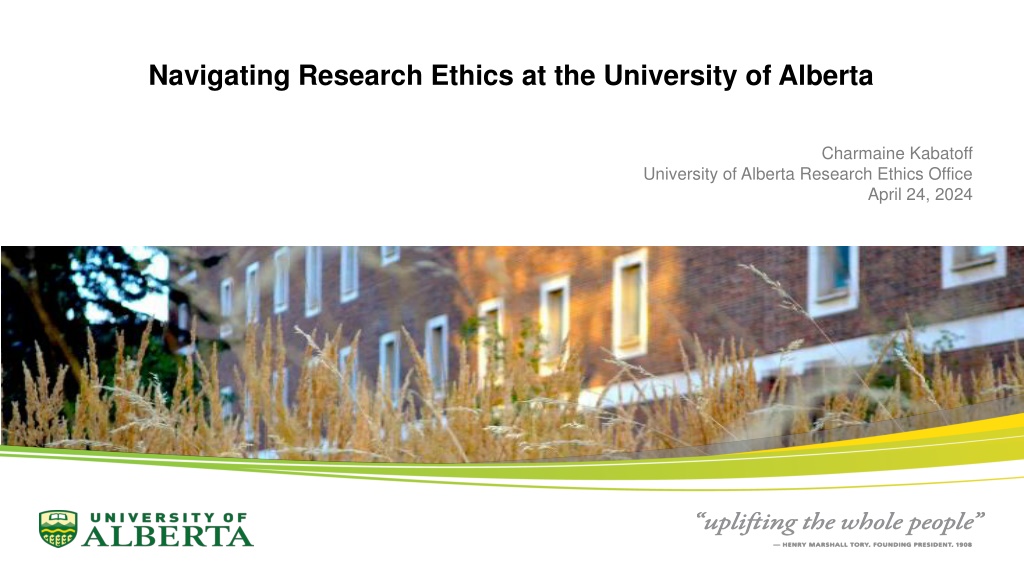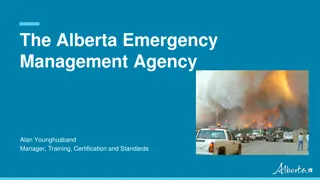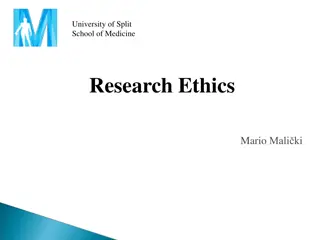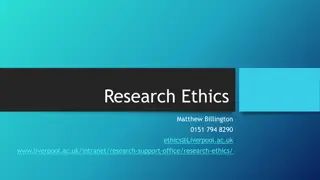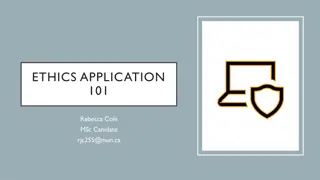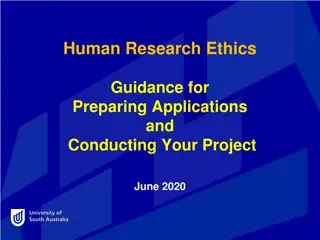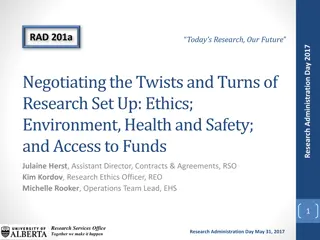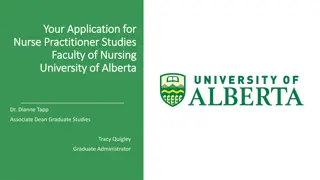Understanding Research Ethics at University of Alberta
Research at the University of Alberta involves disciplined inquiry aimed at extending knowledge, requiring approval from the Research Ethics Board for studies involving human participants. The process includes what research entails, what is not considered research, activities exempt from review, the REB review process, and how ethics reviews aim to protect participants by evaluating risks, benefits, recruitment, consent, and data handling methods.
Download Presentation

Please find below an Image/Link to download the presentation.
The content on the website is provided AS IS for your information and personal use only. It may not be sold, licensed, or shared on other websites without obtaining consent from the author. Download presentation by click this link. If you encounter any issues during the download, it is possible that the publisher has removed the file from their server.
E N D
Presentation Transcript
Navigating Research Ethics at the University of Alberta Charmaine Kabatoff University of Alberta Research Ethics Office April 24, 2024
WHAT IS RESEARCH? An undertaking intended to extend knowledge through a disciplined inquiry and/or systematic investigation. Disciplined inquiry refers to an inquiry that is conducted with the expectation that the method, results and conclusions will be able to withstand the scrutiny of the relevant research community. Can also be descriptive. Research involving human participants requires review and approval by a Research Ethics Board (REB).
WHAT IS NOT RESEARCH? Quality Assurance and Quality improvement, program evaluation activities or performance reviews or testing within normal educational requirements When used exclusively for assessment, management or improvement purposes i.e. assessment of the performance of an organization or its employees, students within the mandate of the organization or according to the terms and condition of employment or training Use this form to request a determination from the REB: Request a Determination Form
RESEARCH ACTIVITIES EXEMPT FROM REVIEW Research that relies exclusively on publicly available information does not require REB review: When that information is legally accessible to the public (i.e. Canada census data) When that information is publicly accessible and there is no reasonable expectation of privacy (i.e. Internet accessible information) Studies that relies exclusively on secondary use of anonymous information so long as the process of data linkage or recording or dissemination of results does not generate identifiable information. Projects that involve the use of Observation.
REB REVIEW PROCESS Each panel meets monthly; schedule posted on the website (uab.ca/reo) Two types of Review Streams Full Board or Delegated. Type of review is related to the level of risk and whether the study is classified as above or below minimal risk Full board (deadline 2 weeks prior to meeting), delegated review - NO deadlines. Researchers should expect the following timelines from submission to final approval: Delegated Review Approximately 1 month Full Board Review Approximately 6 weeks
WHATS INVOLVED? Ethics review is geared towards protecting participants by minimizing the harms or risks to which they are exposed. The REB reviews for: Risks/Benefits Screening/Recruitment Procedures Consent Methodology-Is it good science? Data Confidentiality/Management
RISK/BENEFIT RATIO Determines the type of review required. If risk is no greater than what participants would experience under similar circumstances in their everyday life then the study may be of minimal risk. If risk is greater than what participants would encounter in their everyday lives, the protocol is subject to a higher degree of scrutiny and must make more provisions for the potential participants. The REB must consider whether the potential benefits of a study justify the exposure of people to the potential risks
BENEFIT People participate in studies for a variety of reasons. Sometimes it is for a perceived direct benefit to themselves. Sometimes it is in the hope that the outcome of the study will benefit others in their circumstances. When identifying potential benefits, researchers and REBs should be aware that most research yields no identifiable benefits for participants or their groups but may contribute to our existing body of knowledge. Benefits may be: Direct Indirect Advancement of Knowledge NB: Often overstated by researchers benefit is often what you trying to prove not a given
RECRUITMENT How are potential participants identified? Are they patients? Specific HIA rules may apply. Publicly available lists. Study information forwarded on behalf of the study team. How are participants approached? Who makes initial contact? When is contact made (i.e., during clinical care)? Are there specific recruitment materials?
CONSENT: GENERAL PRINCIPLES 1. Consent shall be given voluntarily. 2. Consent can be withdrawn at any time. No disadvantage or reprisal for withdrawing. The participant can also request the withdrawal of their data. Circumstances where data cannot be removed should be laid out prior to consent. 3. Consent shall be informed. Involves full disclosure of all information necessary for making an informed decision. Provided in a format that ensures understanding. See Forms Cabinet at uab.ca/reo for templates. 4. Consent should be an ongoing process. Researchers have an ongoing duty to provide participants and the REB with all information relevant to the ongoing consent to participate in the research. Researchers have an ongoing ethical and legal obligation to bring to participants attention, any changes to the research that may affect them.
DOCUMENTING INFORMED CONSENT Written consent is a common means of demonstrating consent. Some agencies mandate written consent ( i.e., Health Canada). Consent for access to health information must be written or electronic (HIA Section 34). Oral consent, electronic consent or other means may be approved by the REB. Recording of consent via electronic means or field notes. Consent can be demonstrated by actions of the participant (i.e., implied consent). Participant should be provided with an information letter whenever possible.
PRIVACY/CONFIDENTIALITY Access to records/data Participants identified as a code Who will have the link? Security of records Who will have access? Paper records, kept in a locked office Electronic Records password protected and encrypted Storage of Data 5 years per University policy 15 years if conducted under Division 5
Multi-jurisdictional Research Contemporary research often involves collaborative partnerships among researchers from multiple institutions or countries. It may call upon the participation of a number of local populations and involve multiple institutions and/or multiple research ethics boards (REBs). Examples of multi-jurisdictional research include projects conducted by teams from different institutions, combining data from independent projects, or involving data collection at multiple institutions. Here are some examples: Local researcher is part of a supervisory committee for graduate student at another university. Local researcher contributes to authorship of a publication where contributions to the research were limited to intellectual property contributions, study design or manuscript preparation. Local researcher has multiple institutional affiliations and therefore would need to get ethics at each institution where they hold an appointment. Local researcher receives data/samples from participants enrolled at another site, local activities limited to data/sample analysis. Collaborating with researchers from other Institutions where all researchers are conducting the study at their own site and data will be pooled for analysis and publication.
Category A Ethics approval already in place at the external PI and/or collaborator s home Institution AND; External (non-UA) researcher wishes to have local institutional staff/resources distribute their survey OR; Local researcher is not receiving funding, not collecting data/samples, and/or not receiving data/samples for analysis Streamlined Process 1.These types of projects are not submitted in the ARISE online ethics system. Instead researchers must complete and submit them using our Category A Application.Note: you will be required to upload the REB approval certificate from the lead site as part of the Category A application. 2.Category A approval will be sent via email (not in the ARISE system). 3.Approval by the UA REB for post-approval activities (i.e., renewals and amendments) is not required unless the local researcher s contribution to the project changes.
Category B Ethics approval already in place at the collaborator s home Institution AND; Local researcher may be receiving funding, may be collecting data/samples and/or may be receiving data and/or samples for analysis, however, there can be no local active in-person recruitment to qualify as a Category B. Streamlined Process 1.An ARISE application must be created. 2.Following this guidance to fill out only minimal sections of the ARISE application. The sections of the application to be populated include; information about local site activities that may differ from the approved lead site, local data receipt and storage of data, survey platform being used to collect the data, etc. 3.Approval will be sent via the ARISE system. 4.Post-approval activities (i.e., renewals and amendments) need to be submitted by the local researcher.
Category C Ethics approval already in place at the collaborator s home Institution AND; Local researcher enrolling participants and/or project does not fall into Category A or B and/or project is above minimal risk. Streamlined Process 1.A full application in ARISE must be created and submitted. 2.The REB will take into account the prior ethical review by the lead REB, and will review for local site specific conditions, however the normal REB review processes will be followed (i.e., send to a delegated approver or Full Board at the discretion of the REB). 3.Post approval activities (i.e., renewals and amendments) will be required to be submitted to the UA REB.
REB Exchange (RebX) If you are conducting research with another researcher at the following institutions, the REB Exchange may be able to streamline your REB reviews: University of Calgary University of Lethbridge Research conducted by physicians in private practice within Alberta and approved through the Health Research Ethics Board of Alberta (coming soon -University of British Columbia)
Course-Based Research Course-based research projects or activities are not intended for generalization to other dissemination situations and cannot be disseminated outside of the course. Course-based research projects and activities vary widely in scope, but may include having students: 1. conduct interviews, administer standard tests, or distribute questionnaires with a focus on developing interview or questionnaire design skills; 2. conduct small research projects where students pose research questions, gather data from human participants, and analyze the data for presentation within the course; and/or 3. engage in other activities that would be considered research within the disciplinary traditions in which the course is being taught. 4. It's important to note that course-based research projects are intended for pedagogical purposes and student assessment.
Limitations 1. The research projects must be no more than minimal risk. 2. The research participants must be drawn from the general population, capable of giving free and informed consent, and may not include vulnerable participants and/or persons who lack capacity to consent on their own behalf. 3. The student projects must not involve any personal, sensitive or incriminating topics or questions that could place participants at risk. 4. The student projects must not manipulate behavior of participants beyond the range of normal classroom activity or daily life. 5. The student projects must not involve physically invasive contact with the research participants. 6. The student projects must not involve deception. 7. Human participants must be made fully aware that their participation is for the sole purpose of course-based learning on behalf of the students, and that their information will not only be deidentified or anonymized, it will not be disseminated beyond the course in any form or format. 8. In keeping with the above limitations, secondary use of the data generated through a course based research application for future research will not be permissible.
GUIDELINES Guidelines for Oral Consent: https://cloudfront.ualberta.ca/- /media/research/reo/human-ethics-files/forms-files/guidelines-for-oral- consent.pdf Guidelines for Differentiating among Research, Program Evaluation and Quality Improvement: https://cloudfront.ualberta.ca/-/media/research/reo/human-ethics- files/forms-files/guidelines-for-differentiating-among-research.pdf Recruitment Guidelines: https://cloudfront.ualberta.ca/- /media/research/reo/human-ethics-files/forms-files/2020-06-10-recruitment- guidelines.pdf Use of Email to Communicate with Study Participants Guidance: https://cloudfront.ualberta.ca/-/media/research/reo/human-ethics-files/forms- files/2019-02-01-use-of-email-guidance.pdf Electronic Consent Guidelines: https://www.ualberta.ca/research/media- library/reo/human-ethics-files/forms-files/electronic-consent-guidelines-2021- 01-18.pdf
REO OFFICE Charmaine Kabatoff 780-492-0302 Kim Kordov 780-492-6561 REO Office and ARISE Helpdesk: Website: uab.ca/reo reoffice@ualberta.ca
